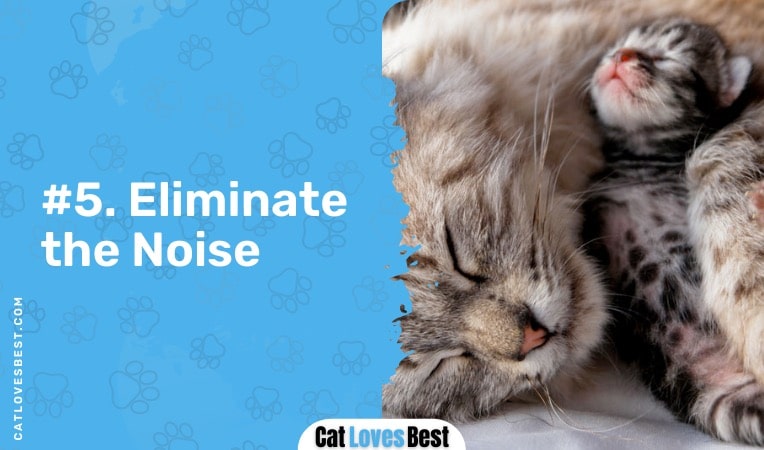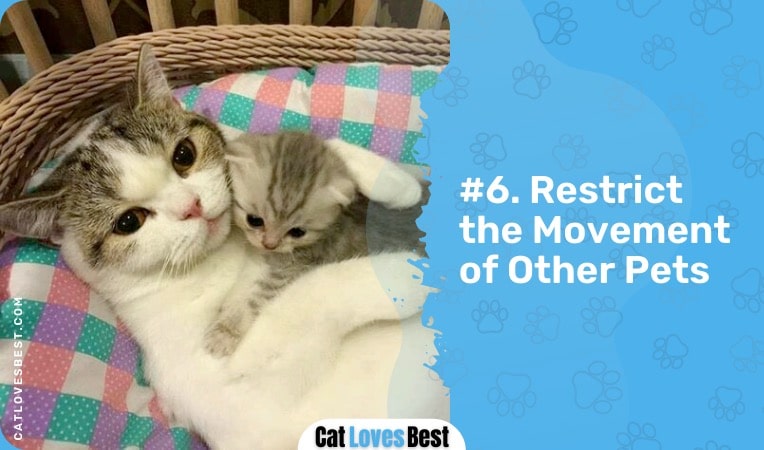Your cat is about to be a mom, and you are all excited to experience this beautiful journey with her! So you just go up and set the coziest nest for your cat while using all the creativeness you have. All of a sudden, your grandmother tells you that, do you know? Cats move their kittens!
That’s a sudden breakdown for you, you might think that why do cats move their kittens when you have already given them the best place to reside! Well, don’t worry, we have 6 proven ways for you to prevent this from happening!
Why cats move their kittens?

Why Does My Cat Move Her Kittens?
One thing you need to understand while handling or adopting any cat, that is cats are very private creatures. Let it be a stray or domestic cat, both tend to have similar preferences when it comes to privacy. You might notice stray cats rotating around your house when they want to give birth.
It’s because they are always looking out for a warm, cozy, and safe place to give birth. So it’s very natural for them to move the kittens if she feels unsafe in the particular spot.
Mostly, the stray cats move their kittens from one place to another because they are under constant threat of being a victim of predators, such as birds, dogs, and other wild animals.
6 Proven Ways: Stop Your Cat from Moving Her Kittens
Though you made the coziest bed for your cat and her upcoming babies to rest on, being as creative as possible and still your cat is not even considering that space. There’s got to be something wrong with it! Or that’s not the way it works for our cats. So, we have all the solutions to your question, Why do cats move their kittens?
Here are six ways to stop your cat from moving her kittens:
1. Don’t Touch the Kittens Too Often
The sigma rule for or maybe you can say the universal rule for all the humans which was once passed to us by our mothers, grandmothers or grandfathers and fathers!

Is, never touch a newborn. While some people must have experienced it, on the other hand, some must have hurt.
Cats will either start leaving the kitten behind who has been touched by humans or other predators, or she will leave the spot as soon as possible.
Cats have 14 times stronger smelling sense, so she can easily tell if her kittens were touched by a stranger. We know It’s quite hard to control yourself from picking up these tiny little kittens.
Even though your cat knows you, she won’t be wanting you to pick her tiny babies when they are just a few days old. This is because mother cats spread their scent by licking each kitten, and when we touch them we give them our smell, mother cats might feel unfamiliar if the kitten is not carrying her smell.
Restricting visitors is also the best option to make the cat feel safer, we know how much your friends can beg you to allow them to come and see cute little newborn kittens. But that’s the worst thing you could ever do with your cat and her kittens.
Because she might just feel unsafe about the place with so many strange predators.
2. Calm, Quiet, and Clean Place for Kittens
Being a cat parent, these top three things, calmness, quietness, and cleanliness. Cats are very clean and tidy creatures! And they absolutely hate being in a messy atmosphere.

Just like you can get OCD of excessive decorating your home during Christmas, cats tend to prefer themselves clean and surroundings even cleaner. They believe that the strong scent can give an invitation to so many uninvited predators.
That’s why your cat’s nest looks dirty one day and the next day all the kittens with cat mom are gone! Understand that it was very dirty for your cat to stay there.
All you need to do is keep a tab of its condition, if you have kept blankets make sure you change them, so that the smell of any pee or poo is gone, the smell of spilled food or milk is gone.to make the mother cat stay in your home you got to keep the nest as well as its surroundings clean.
3. Monitor Health of Mama Cat
You know, some cats can eat their kittens, though it’s a rare event it’s very common for wild animals to do so if their babies are sick, ill, or deformed. So if you catch your cat moving, only one kitten, you need to take it to the vet and ask them about hand waving the left kitten, because there are 90% chances of him being sick.

However, don’t try to put it back in the nest if you found the abandoned kitten, as the mother cat can sense his bad health and doesn’t want it. In the worst case, she might kill him.
Talking about the health of the mother cat, she can suffer from a good deal of health issues during this stage of her life. And yes, they can be the reasons behind why mother cats will move their kittens.
Metritis: a uterine infection that usually occurs within a week after a cat gives birth, an inflammation of the endometrium (lining) of the uterus due to a bacterial infection.
Mastitis: mastitis is extremely painful and, if left untreated, the bacteria can spread and the mama cat can become seriously ill. Mastitis causes the mammary gland to become blocked, thus milk cannot be released, it can be such an undesirable experience for cats while nursing their kittens.
4. Keep the Nest Warm
This is no rocket science, as cats love to reside in quite warmer areas, according to their normal body temperature. As newborn kittens can regulate their own body temperature, they need someone else to do this job, mamma cats, to keep them warm.

If the nest is too cold, even mama cat will fail to do so. You should always keep the doors and windows closed, if you want you can also insert a thermometer in the room.
5. Eliminate the Noise
Many times, cats can get affected by the excessive noise in the background, and it could really make changes in their day-to-day life, for example, if you have kept the litter box of your cat in a room which is close to the roadside, there are 80% chances of her not using it due to the disturbance in the background.

So just imagine how skeptical she’s going to be when it comes to her kittens. Make to select such a place for the nest of your cats that is away from the roadside.
6. Restrict the Movement of Other Pets
Even if your cats and her kittens are safe and sound, there are chances of her being extra sensitive and careful about the safety concern after giving birth to her kittens, this is because cats in the wild have the constant fear of strangers and predators.

Domestic cats have the same instinct as outdoor cats. That’s why if you have a house with multiple pets, make sure to keep them away until the kittens are 4-5 weeks old.
What to Do If She Still Moves Her Nest?
Even after we gave you all the answers with proven ways to stop it, Why do cats move their kittens? It’s not necessary that your cat will follow it blindly, she still might think of moving her kittens. So if you have tried all these methods to encourage your cat from not moving.
It’s totally her choice to move, then you should not force her to stay at your chosen place because once cats feel threatened they might get stressed, which will affect her health. So you just need to accept it.
Conclusion
Why Cats Move Their Kittens? Have various reasons, and we have provided you with the most effective and proven way to prevent moving her kittens. Cats might develop a feeling of stress and anxiety if they sense even the smallest threat.
However, you should not force them to stay if the ways don’t work because again it’s completely normal.
References
- Kitten play — UC Davis
- How mother cats take care of kittens — Pet Place
- Kitten care — The Ohio State University

